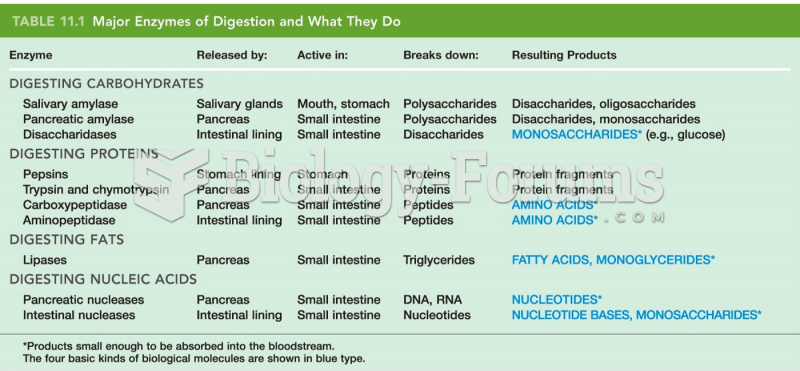Answer to Question 1
1
Rationale 1: Digestion is the process by which the body breaks down ingested food into small molecules that can be absorbed.
Rationale 2: Cardiac output is the amount of blood pumped by the heart through the circulatory system in 1 minute.
Rationale 3:Peristalsis is when substances are propelled along the GI tract by the contractions of several layers of smooth muscles.
Rationale 4:The stomach contents are further neutralized by bicarbonate from pancreatic and biliary secretions.
Global Rationale: Digestion is the process by which the body breaks down ingested food into small molecules that can be absorbed.
Answer to Question 2
1, 2, 3
Rationale 1: The goals of pharmacotherapy are to provide immediate relief from symptoms, promote healing of the ulcer, and prevent recurrence of the disease. The choice of medication depends on the source of the disease (infectious versus inflammatory), the severity of symptoms, and the convenience of OTC versus prescription drugs.
Rationale 2: The goals of pharmacotherapy are to provide immediate relief from symptoms, promote healing of the ulcer, and prevent recurrence of the disease. The choice of medication depends on the source of the disease (infectious versus inflammatory), the severity of symptoms, and the convenience of OTC versus prescription drugs.
Rationale 3: The goals of pharmacotherapy are to provide immediate relief from symptoms, promote healing of the ulcer, and prevent recurrence of the disease. The choice of medication depends on the source of the disease (infectious versus inflammatory), the severity of symptoms, and the convenience of OTC versus prescription drugs.
Rationale 4: Constipation is not an issue with ulcers.
Rationale 5: Diarrhea is not an issue with ulcers.
Global Rationale: The goals of pharmacotherapy are to provide immediate relief from symptoms, promote healing of the ulcer, and prevent recurrence of the disease. The choice of medication depends on the source of the disease (infectious versus inflammatory), the severity of symptoms, and the convenience of OTC versus prescription drugs. Constipation is not an issue with ulcers. Diarrhea is not an issue with ulcers.







